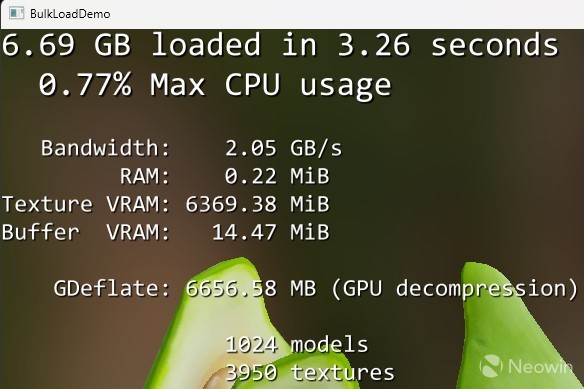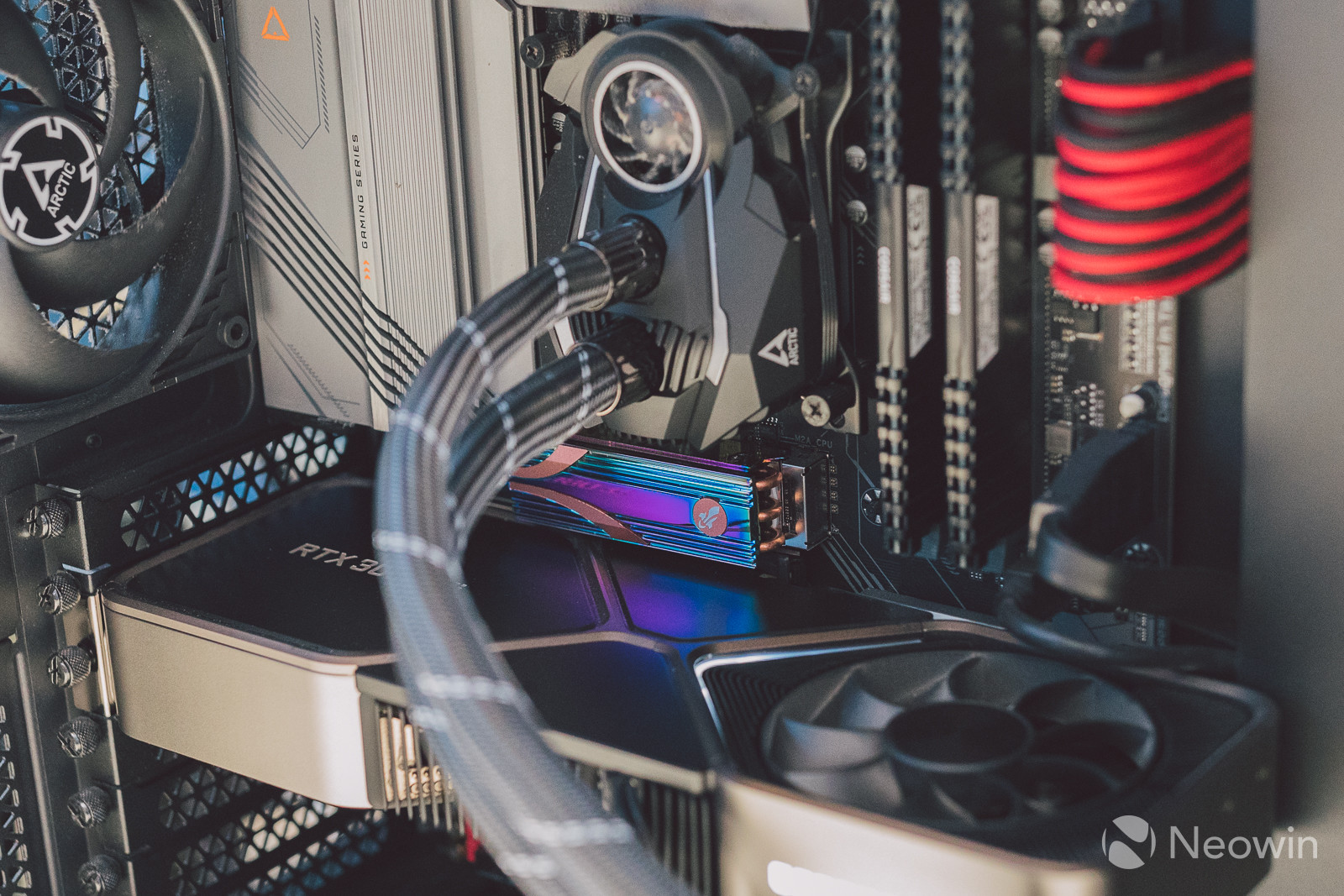Introduction
Now at version 1.1, DirectStorage is finally here, but let's not jump for joy just yet. Whilst the technology is out to be made use of, widespread adoption will take time. For example, the only DirectStorage game currently available is the recently released Forspoken, and this title only employs DirectStorage 1.0, so no advanced features such as GPU Decompression. But whilst it might be a version out of date, the game does leverage the technology behind the name and speeds up load times to under 1 second in many instances.
To make use of DirectStorage, PC gamers will need an NVMe SSD (as well as a DirectX 12 GPU) with at least PCIe Gen 3 spec under the belt. SATA SSDs can leverage it, too, but the full potential is only realised with an NVMe drive that can leverage the large amount of read speed bandwidth available which is typically 3500MB/s or more versus the ~550MB/s offered by a SATA SSD, along with the far higher IOPS NVMe offers which will help smaller file assets a game needs to be read quicker and sent to the GPU.

NVMe SSD makers do not necessarily need to do anything special to take advantage of DirectStorage either. As noted, even a Gen 3 with just 3500MB/s read speeds is enough to enjoy 1 second load times in games like Forspoken. So, when Sabrent offered to send out their flagship drive, the Rocket 4 Plus-G in impressive packaging shown above, I was eager to find out what it was all about. This model comes with a DirectStorage focused firmware.

Included in the review bundle was their optional Gaming Heatsink, too. Not essential, but recommended to get the best performance out of a drive, especially if it's being installed near a modern GPU that gets hot. Worth noting that this heatsink isn't just for Sabrent drives either, you could buy it on its own, and it's not expensive. The quality is very high and it comes with brackets for both single and double sided NVMe drives, along with thermal contact pads pre-applied.
Specifications
| Model on review | Rocket 4 Plus-G SSD (SB-RKTG-2TB) |
| Capacities | 1TB, 2TB, 4TB |
| Read speed | Up to 7300MB/s |
| Write speed | Up to 6900MB/s |
| TBW | 700 (1TB), 1400 (2TB), 2800 (4TB) |
| Warranty | 2 years standard, or 5 years after registration |
| Form factor | NVMe M.2 |
| SSD controller | Phison E18 |
| PCB design | Double-sided |
| Cache | 2GB of SK Hynix DDR4 |
| Storage | 8x 256GB Micron 176 layer TLC NAND Flash |
| Price | $299.99 |
In testing
This review is based on testing on the following spec PC:
-
CPU: Intel i7 -12700KF
-
Motherboard: Gigabyte Z690 Gaming X DDR4
-
RAM: 64GB DDR 4-3200
-
GPU: RTX 3080 Ti Founders Edition 12GB
-
OS: Windows 11 Pro
With over 7000MB/s read speeds, the Rocket 4 Plus-G is up there with the best SSDs on the market right now, such as the Samsung 990 Pro, although Samsung are currently in the middle of an ongoing issue with that model which we wrote about recently.
First up, I fired up CrystalDiskMark and achieved close to the official specifications. I compared against Samsung's latest flagship SSD, the 990 Pro, my old Samsung 970 Evo Plus which is a PCIe gen 3 NVMe, and a SATA 8TB SSD, the Samsung 870 QVO:
| Sabrent Rocket 4 Plus-G 2TB (PCIe gen 4) | Samsung 990 Pro 2TB (PCIe gen 4) |
|
|
|
| Samsung 970 Evo Plus 1TB (PCIe gen 3) | Samsung 870 QVO 8TB (SATA) |
|
|
|
As you can see, all drives offer very impressive transfer numbers, and what remains impressive, and more important for NVMe drives, are the random 4k transfer speeds which is what most people will be experiencing most often in day-to-day use as it relates to lots of smaller file reads and write. The bigger this number, the better the overall multitasking and working with lots of smaller file experience is, especially if the drive is being used for the OS and applications as well as gaming, as opposed to just being used to store games and data on.
The IOPS are also impressive, with nearly 1.3 million for the write and just over 1 million for read: Sabrent don't officially state what the IOPS are supposed to be, but the resulting figures below land nicely in the ballpark of the Samsung 990 Pro, if a little lower than what Samsung claim of 1.4 million IOPS read, and 1.55 million write.

Compared to a fast SATA SSD, the transfer speed uplift is massive. Although if you are still on a SATA SSD, then there's no need to worry just yet (unless you want to make use of DirectStorage), because Windows will still boot and run nearly just as quick as on the faster NVMe drives. My experience of this was upgrading via cloning from a SATA SSD originally, to NVMe Gen 3, and now Gen 4. I have noticed no change in Windows cold-boot times which were under 20 seconds anyway, as well as application load times.
The differences observed outside of gaming between all the SSDs above are that when working with lots of smaller files in one go, or batch processing workloads, then the NVMe drives offer the greater performance. This is thanks to the big jump in bandwidth and IOPS compared to a SATA or below PCIe Gen 3 SSD.

It was time to move onto avocados, no, really!
This benchmark is called the BulkLoadDemo, and it utilises DirectStorage 1.1 mentioned at the start of the review. The test comprises of loading many avocados using GPU Decompression. This benchmark is a good indicator of how well a drive will perform with DirectStorage in future games. Since there are currently no applications or games that utilise version 1.1 of the tech, this is all we have, for now.
| Sabrent Rocket 4 Plus-G 2TB (PCIe Gen 4) | Samsung 970 Evo Plus 1TB (PCIe Gen 3) |
|
|
|
Notice that the PCIe Gen 3 970 Evo Plus was able to leverage 11.95GB/s through DirectStorage 1.1 GPU Decompression, whilst the Gen 4 Rocket 4 Plus-G is at 15.5GB/sm highlighting that even a Gen 3 drive is capable of high throughput. This translates to impressively close load times to the Gen 4 in the Forspoken results further into the review.
Just out of curiosity, I ran the same test on the SATA SSD, and got the following:

In practice
The BulkLoadDemo benchmark was useful for putting some hard figures onto a drive's performance with DirectStorage, but does that translate into actual real-world performance though?
Let's look at Forspoken's built in benchmark that reports loading times using DirectStorage 1.0. I will only be focusing on the NVMe drives for this part of the review since the specification requires an NVMe drive for full support. For reference, this was played at maximum settings with Ray Tracing effects enabled and at a resolution of 3440x1440 with DLSS set to Quality.
The results are quite telling. Between the gen 3 and gen 4 drive, the loading time difference in is so small that I do not notice the difference at all. Granted, Forspoken only uses version 1.0 of DirectStorage, so until a game (or an update to this title) is out that uses version 1.1, we will remain no wiser as to the practical gaming benefits with DirectStorage, with or without an SSD that was designed for it.
Now, the games coming out with DirectStorage are not listed anywhere, so which games will or won't is unknown. There are however some games that specifically recommend a PCIe SSD, such as Dead Space Remake. Games like that load into your save point the moment you leave the title screen with zero load times, and zero loading anywhere else in the game.

Whether game developers make use of DirectStorage or simply take advantage of the bandwidth an NVMe SSD offers instead remains to be seen. The technology's API has been out a few months now, so we will just have to wait and see.
At present, for gaming, an SSD made for DirectStorage does not appear to be any different to a standard Gen 3 SSD. Whether this changes in the future would be pure guesswork right now, as we have no idea how game developers will implement the technology.
Conclusion
Sabrent's drive may well excel in DirectStorage, but because of no real application out there utilising it right now, it is impossible to say to what degree that might be. As it stands, the Rocket 4 Plus-G is an excellent all-round SSD anyway that puts itself firmly into the top tier performers of PCIe Gen 4 SSDs on sale right now.
Whilst the benchmark and gaming results did not show any major gains from the DirectStorage firmware on the Rocket 4, I do have to say I am very impressed with the quality of the overall package from the moment you unbox the drive and heatsink.
The heatsink is solid and heavy, the quality of the finishing is superb. Also, theSSD itself has high quality labelling and thermal layer unlike what appears to be a thin layer on the Samsung 990 Pro.

Once installed, the Rocket 4 Plus-G is also quite the looker inside the system, it suits both plain boring looking cases like mine, as well as RGB setups that others may have.

The one area where I think Sabrent could improve is with their Control Panel utility that gives you the ability to check for firmware, drive health and other features. It just does not look like something that's been polished up since the late 90s, whereas Samsung's Magician and Western Digital's Dashboard tools offer a much more modern experience.
Having said that, it is not a tool that needs to be opened often, and when you do use it, it's to check for something specific, so for that use case it does the job exactly as intended. It also does not need to run a background service or system tray icon, unlike those tools from Samsung and Western Digital, so kudos to Sabrent for that.

Sabrent seem to have a loyal following, too, and the reliability record seems solid as well. This was my first experience with a Sabrent drive, and overall, I am impressed with the presentation, material quality and performance. Is the performance that much better than the competition? No, not right now anyway.
Will it be better in the future? Perhaps, but by then any margin will likely be closer anyway as the competition also release DirectStorage firmwares when it is more mainstream in adoption. One thing I will say is that throughout my week of testing, the Rocket 4 has been consistent in all benchmarks, whereas the Samsung 990 Pro was all over the place, especially with the write speeds in CrystalDiskMark often varying from 5500MB/s and up. I have not seen such swings with the Sabrent.
The Rocket 4 Plus-G series is currently discounted on the Sabrent USA website and on Amazon coming in at $169.99 for the 1TB, $299.99 for the 2TB and $699.99 for the 4TB. The gaming heatsink is $29.99 respectively. For UK buyers, things are a little more eye watering, as Amazon list this model at £177, £311, and £742 for each capacity.
Our stories may contain affiliate links for products/apps where Neowin is paid an affiliate fee if you complete a purchase via those links.





























1 Comment - Add comment